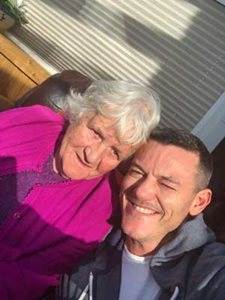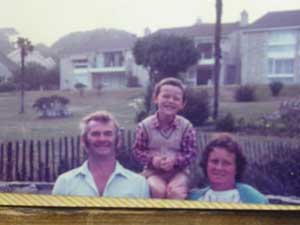
Double Your Impact for the Holidays
Double Your Impact for the Holidays
Your urgently needed year-end gift can go twice as far to provide care and support and accelerate Alzheimer's research this holiday season — and all year long. Show your giving spirit today during this 2x Match Challenge.
Donate NowQ&A With Actor and Activist Luke Evans: “My Nanna Was the Center of Everything”
Actor and activist Luke Evans recently spoke to us about his family’s Alzheimer’s journey with his Nanna, the matriarch of their family.
Luke, tell us about your grandmother.
 My grandmother, or Nanna as I often call her, was a very special person to me. We were very, very close. She was the matriarch of our family with six children. She was vibrant and opinionated. Full of life, full of love and full of laughs. She really was the center of everything. I adored her.
My grandmother, or Nanna as I often call her, was a very special person to me. We were very, very close. She was the matriarch of our family with six children. She was vibrant and opinionated. Full of life, full of love and full of laughs. She really was the center of everything. I adored her.
What were some of the early signs that you noticed with your grandmother that something might be wrong?
At first, it was putting things in the wrong drawers in the kitchen. Putting cutlery in the oven or putting plates away in the microwave. The kitchen was a place she spent a lot of time in, so it was a very quick sign to us that something was not right. I thought to myself how scary it must be for the person with Alzheimer’s when they are in those moments of confusion and not understanding why it’s happening.
My mom and dad were very good at accepting and adapting to what was going on. It wasn’t like that for my grandfather. He thought she was just being forgetful. He really struggled to believe that there was something wrong when it was very clear there was. And, you know, that was hard for us, too. We had to help my grandfather understand that his wife of 60 years was not going to get better.
How would you describe Alzheimer’s to someone who has not experienced it first hand?
The best way I can describe it is the person is on their own boat out at sea. Every now and then, a gust of wind will bring them back to the harbor, just to blow them out to sea again. You are slowly losing them to the disease but there are these moments they come back to you. And when they do, relish those moments and tell them how much you love them.
What did you learn about yourself from being touched by Alzheimer’s so personally?
Watching someone who was the center of the conversation become quieter and more and more distant — watching the deterioration of their personality and that light slowly diminishing — it was a horrible thing to see.
But I learned acceptance, as painful as it was. I learned to accept and embrace the moments I had with my grandma, and to hold onto those moments. Whether someone with dementia remembers or not, the love you give them — the happiness and sense of security — is all that you can do. And, you have to know that matters.
Is there any advice that your grandmother gave you that sticks with you to this day?
Slow down! Ha-ha. Because I live my life so fast. Because I’m always traveling. And, because my life is so full. She would always tell me to slow down. I haven’t been the best at taking that advice but one day I will!
From my years of traveling a lot, I always sent my grandmother postcards. I think she had about 360 postcards. I feel like because of that I was always present to her even when I wasn’t physically there. She was aware of me and my journey.
 And, as her memory faded, the memory of me stayed with her. I was very lucky. She never forgot who I was.
And, as her memory faded, the memory of me stayed with her. I was very lucky. She never forgot who I was.
Being an actor, why is it important that movies, and pop culture in general, address complicated topics like Alzheimer’s and other dementia?
Right around the time my grandmother was diagnosed, “Still Alice” with Julianne Moore came out. Her character was at the height of her career and life. An incredibly intelligent woman. But, Alzheimer’s slowly started taking her away, piece by piece.
When you think of the amount of people who are living with Alzheimer's — it is super important for this disease to be represented in films like “Still Alice,” on television and in documentaries, and for people like myself to be talking about it. Because by putting a spotlight on Alzheimer’s disease on screen, we are also raising awareness off screen.
You’ve spoken about your grandmother and the power of music – with your music in particular – while she was living with Alzheimer’s. Is there a song that reminds you of your Nanna, or brings you back to a meaningful memory of her?
One of the last memories I have of my grandmother was the night before she died. I was in Australia filming “Nine Perfect Strangers” in 2020 and my mom called and said that she had been unresponsive for a couple of days. Saying it might be her last night.
Because I couldn’t be with her, I sang “You are so beautiful (to me)” to her over the phone. Her eyes opened and she woke up for a fleeting moment. My mom couldn’t believe it. Music was always a strong connection for me and my grandma. She was so proud of my music and loved my voice.
That final moment with her is one that I’ll always hold really close to my heart.

The first survivor of Alzheimer's is out there, but we won't get there without you.
Donate Now
Learn how Alzheimer’s disease affects the brain.
Take the Brain Tour
